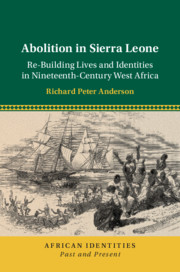Book contents
- Abolition in Sierra Leone
- African Identities: Past and Present
- Abolition in Sierra Leone
- Copyright page
- Dedication
- Contents
- Illustrations
- Acknowledgments
- Notes on the Text
- Abbreviations
- Introduction
- 1 Liberated African Origins and the Nineteenth-Century Slave Trade
- 2 Their Own Middle Passage
- 3 “Particulars of disposal”
- 4 Liberated African Nations
- 5 Kings and Companies
- 6 Religion, Return, and the Making of the Aku
- 7 The Cobolo War
- Conclusion
- Appendices
- Select Bibliography
- Index
6 - Religion, Return, and the Making of the Aku
Published online by Cambridge University Press: 09 January 2020
- Abolition in Sierra Leone
- African Identities: Past and Present
- Abolition in Sierra Leone
- Copyright page
- Dedication
- Contents
- Illustrations
- Acknowledgments
- Notes on the Text
- Abbreviations
- Introduction
- 1 Liberated African Origins and the Nineteenth-Century Slave Trade
- 2 Their Own Middle Passage
- 3 “Particulars of disposal”
- 4 Liberated African Nations
- 5 Kings and Companies
- 6 Religion, Return, and the Making of the Aku
- 7 The Cobolo War
- Conclusion
- Appendices
- Select Bibliography
- Index
Summary
The penultimate chapter broaches the question of why, given the multifarious origins of Liberated Africans, a single recaptive nation – the Aku – came to dominate colonial and missionary discourse on recaptives, as well as most subsequent historical accounts of Liberated African society. Most studies of Sierra Leone have asserted that “Aku” was a colonial term for Yoruba peoples from present-day Nigeria and have echoed contemporary observations that they were the largest and “most cohesive” group within Sierra Leonean society. This chapter considers the role of language in shaping Aku identity, and the interaction between Islam, Christianity, and “traditional” oriṣa worship in defining the Aku. It then traces the shifting relationship between diaspora and homeland, as Aku merchants and missionaries returned to coastal towns near their ancestral homes after 1838, bringing with them a more encompassing sense of Yoruba ethnicity. This chapter argues that what it meant to be Aku in Sierra Leone and what it meant to be Yoruba in Yorubaland were defined and reinforced through a dialogue along the Atlantic coast of West Africa. In doing so it advocates for a nonlinear conception of diaspora that applies not only to the Americas but to diasporas within the African continent.
- Type
- Chapter
- Information
- Abolition in Sierra LeoneRe-Building Lives and Identities in Nineteenth-Century West Africa, pp. 192 - 226Publisher: Cambridge University PressPrint publication year: 2020



